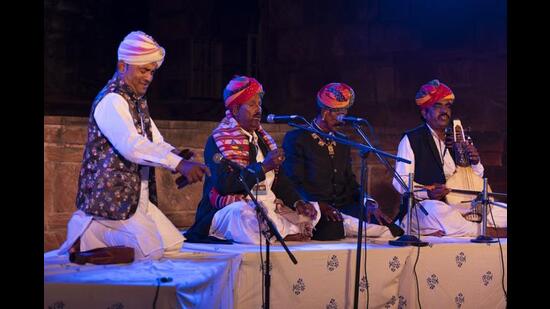Chonta DJ; riding the third wave in Latin American music
Alejandra Gomez aka DJ Chonta, who played at the Jodhpur RIFF, talks about her music management company and future collaborations with Rajasthani folk musicians
Alejandra Gomez was an undergraduate student of philosophy and music theory at Rutgers University in New Jersey when she felt drawn to the essence of knowledge enshrined in ancient Indian texts. “I was studying aesthetics and philosophy of language and was quickly attracted to Hindu philosophy,” says Gomez about her campus days in the United States a decade ago. “And music was central to what I was learning from Hindu philosophy.” The elements of dance and music in the Vedas gave her the context she needed to understand the central link in the relationship between philosophy and aesthetics. “American universities allow you to delve deep in your pursuit of knowledge,” smiles Gomez, who was a participant at Jodhpur RIFF held from 26 to 30 October in Rajasthan’s city on the edge of the Thar desert.

A successful music manager from Colombia’s Cali, a city on the Pacific coast, Gomez, who always carries a copy of the Bhagavad Gita with her, is currently leading a third wave in Latin American music. Cali, which is notorious for being on the drug smuggling route between South America and the US, is also home to salsa choke, a Pacific coast dance made famous by Colombian players like James Rodríguez to celebrate their goals at the 2014 FIFA World Cup in Brazil.

Founder of an all-woman music management company called Biche headquartered in Bogota, Gomez is working hard to record the Afro-Colombian music that is central to her home town. Afro-Colombian music is heard at major music festivals in the world today through bands like Grupo Canalón de Timbiquí famous for its marimba-ruled celebratory folk song Tío Guachapesito and the navigation sound-filled Bogando by Semblanzas del rio Guapi, which stresses on the community’s link with nature.
“Afro-Colombian music is spiritual. Its purpose comes from the community and is related to nature,” explains Gomez, who, instead of pursuing the usual American Dream, returned to Bogota after a four-year stay in New Jersey and joined the Colombian music industry. Bogota and the whole of Colombia was then following other Latin American countries in recording only Afro-Caribbean music popular across the world through singers like Shakira. “I wanted to change that,” says Gomez about her work in promoting Afro-Colombian musicians.
It was a slow and steady start for the young music manager who was set on discovering alternative music belonging to the Pacific coast. That was in 2010. Two years later, Gomez founded her own music management company and called it, Biche – Spanish for “immature”. “I was 24 years old and was managing my own company,” says Gomez, whose family owns a grocery business in Cali. “I started with two Afro-Colombian bands, Mitú and Los Piranhas. Both were known to the world music scene in Europe and the US.” The two-member Mitú included Julian Salazar, the former guitarist of Bogota’s cumbia band, Bomba Estéreo. The bands Gomez manages today include the Bogota-based Frente Cumbiero of Mario Galeano known for the popular tropical song Ananas Tornillo (Pineapple Twist) and Mucho Indio, whose legendary guitarist Tete Ocampo composed the theme music of Embrace of the Serpent, the first Colombian film to be nominated for an Oscar for Best Foreign Language Film in 2016.
Biche soon grew into an all-woman company and Gomez co-founded Todopoderosa, an organisation for female representation in Colombia’s music industry. “Half of the musicians, composers and music directors in Colombia are women. It was important to organise them,” she says. Come 2020 and the pandemic changed everything. “I was locked in my room in Bogota,” she says. “I wondered why I wasn’t in Cali with my family appreciating life a little more.” She decided to move to Cali, a big career decision because the music industry is centred on Bogota. A vintage mixing console and an old mansion, however, would go on to make all the difference.

The vintage analogue console that a wealthy German family in Bogota wanted to sell was fundamental to Colombian discography. “I decided to buy it,” beams Gomez. Back in Cali, she heard a Lebanese-Colombian family was selling their old mansion and moved fast to buy it. The mansion will now house a studio. “The studio is going to record Afro-Colombian music. It will be a space around the community for the next wave in Latin American music,” she says. At the Jodhpur RIFF, Gomez, who is also known as DJ Chonta, played Afro-Caribbean music on vinyls she had carried from Colombia. “There are no vinyls of Afro-Colombian music today. Our studio will change that,” says Gomez, who intends to collaborate with Rajasthani folk musicians. “The studio will also have a residency for the Manganiyars and Langa musicians from Rajasthan, whose music style is so much like Afro-Colombian,” she says.
Faizal Khan is an independent journalist who writes on art.
All Access.
One Subscription.
Get 360° coverage—from daily headlines
to 100 year archives.



HT App & Website







